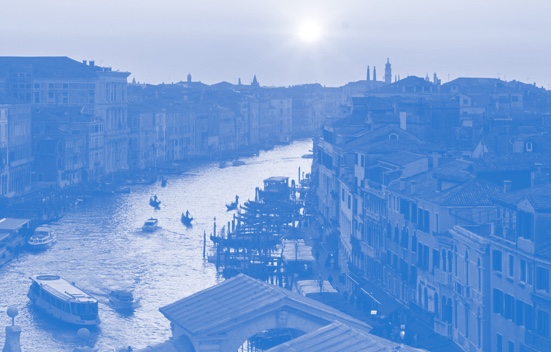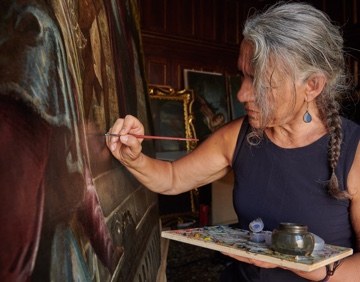March 17, 2021|17.00 CET (12:00PM ET)|Virtual Event
The History, Patrimony, and Conservation of the Venetian Church of San Marziale
Zoom
March 17, 2021|17.00 CET (12:00PM ET)|Virtual Event
The History, Patrimony, and Conservation of the Venetian Church of San Marziale
Zoom
The History, Patrimony, and Conservation of the Venetian Church of San Marziale
Virtual Research & Restoration Roundtable
Rosand Library & Study Center at Save Venice
This presentation is dedicated in memory of Frances R. Kolarek (1917-2021), a founding supporter of the Rosand Library & Study Center at Save Venice.
*This talk will be in English and will take place virtually on the Zoom platform on Wednesday, March 17, 2021 at 5 PM (Central European Time) | 12:00 PM (Eastern Time). Participation is free and open to all, but registration is required. A recording of the presentation will be available on Save Venice’s YouTube channel.
Art historian Nora Gietz discusses the origins and history of the Venetian church of San Marziale, the significance of the artworks held within, and the rationale behind the building’s preservation during the Napoleonic parish reform in the early 19th-century. Probably dating back to the first half of the twelfth century, the church has very ancient origins. It is dedicated to Saint Martial of Limoges, the French city’s first bishop, who, according to medieval hagiography, was baptised by Saint Peter himself. Not long after San Marziale’s foundation, the miraculous late-gothic Votive Sculpture of the Madonna and Child (Our Lady of Graces), arrived in the church. It was restored by Save Venice in 2020.
The second part of this presentation will give an overview of the artworks housed in San Marziale to this day. Jacopo Tintoretto’s Saint Martial in Glory with Saints Peter and Paul (1549), that was restored by Save Venice and unveiled for the 2019 Palazzo Ducale exhibition before travelling to the National Gallery in Washington DC, of course plays a central role in the church to this day. It was placed in its new altar sculpted by Giacomo Piazzetta when the church was rebuilt as a single nave around 1700 to give it its current appearance. Giovanni Comin created the new altar for the statue of Our Lady of Graces and Sebastiano Ricci painted the ceiling frescoes on the same occasion. San Marziale is also home to works by Giulia Lama, the eighteenth-century female painter.
Finally, the fate of San Marziale after the end of the Venetian Republic in 1797 will be examined. In 1807, the Napoleonic Italian Kingdom decreed a reform to reorganise the Venetian diocese. Hitherto unpublished documents testify that San Marziale almost lost out to the nearby Santa Maria dei Servi when the church of the suppressed Servite convent was considered as a new parochial seat. In the end, San Marziale was chosen and preserved as parish church, and the Servi closed and eventually demolished. In 1875, the parish was moved again to the nearby Madonna dell’Orto and San Marziale conserved as subsidiary church which it still serves as today.
Nora Gietz is an art historian and historian working predominantly on the Revolutionary and Napoleonic period in Venetian history. She is particularly interested in how this political and cultural watershed after the fall of the thousand-year-old Venetian Republic affected the lagoon city’s artistic and architectural patrimony as a consequence of the widespread dissolutions of religious institutions. She completed her undergraduate studies in Modern History at the University of Oxford before moving to the University of Warwick’s Art History Department for her Master’s and Doctorate. Her studies were sponsored by the Gerda Henkel Foundation, the Centro Tedesco di Studi Veneziani, and the Gladys Krieble Delmas Foundation. She co-edited the book “Ebbi fame e mi deste da mangiare” Luoghi, principi e funzioni della charitas veneziana, 1260-1806 (Modena, 2018) on the concept of charity in Venice, for which she also wrote on the Napoleonic suppression of Venetian confraternities, with Save Venice fellow Gabriele Matino. She contributed to Save Venice’s celebrations of the 500th anniversary of Tintoretto’s birth with entries for Tintoretto in Venice. A Guide (eds. T. dalla Costa, R. Echols and F. Ilchman, Venice, 2018).


Discover the work of Save Venice
View Venice Tours Members Matter
Save Venice members share a passion for Venice, art, architecture, history, culture, and travel, and provide the essential funds needed to sustain our mission of preserving Venice’s artistic patrimony.
Member support is crucial to making our conservation projects and educational programming possible, which is why members receive privileged access and special benefits. Explore everything membership has to offer at each of the following levels.
Join Now Member support is crucial to making our conservation projects and educational programming possible, which is why members receive privileged access and special benefits. Explore everything membership has to offer at each of the following levels.
News & Stories
New York Office
133 East 58th Street, Suite 501
New York, NY 10022
Venice Office
Palazzo Contarini Polignac
Dorsoduro 870 30123 Venice, Italy
Rosand Library & Study Center
The Rosand Library & Study Center is accessible by appointment.
New York Office
133 East 58th Street, Suite 501
New York, NY 10022
Venice Office
Palazzo Contarini Polignac
Dorsoduro 870 30123 Venice, Italy
Rosand Library & Study Center
The Rosand Library & Study Center is accessible by appointment.